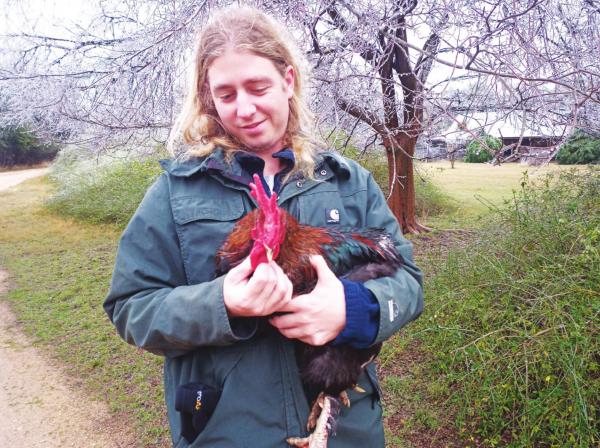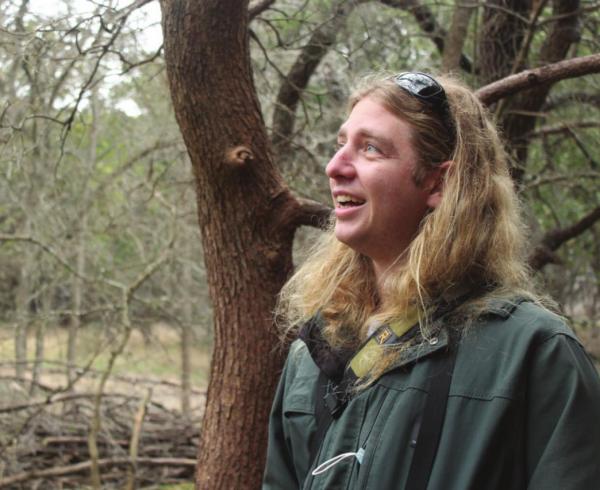RARE BIRD: Huth is an avian specialist
Jesse Huth hops out of his car. He has binoculars dangling from his neck and a camera with a footand-a-half-long lens draped over his shoulder.
You see, Jesse is a bird guy. He loves birds — all kinds. If he spots a rare bird, he’s prepared.
When he was four or five years old he talked his parents into letting him get some chickens. His flock prospered and he sold fresh eggs around town. For an Eagle scout project, he built the bird blind in the nature refuge behind the Wimberley Community Center. At Texas A&M, he majored in Poultry Science, then went on to get a master’s degree in Chicken Welfare and Behavior. He now runs Huth Avian Services, a business that advises chicken owners, conducts birding tours and surveys the wild-bird populations on local properties.
Yes, Jesse is definitely a bird guy.
“Why do I like birds?” Jess asks. “They are beautiful. They are fun. Plus, I like to make lists and with birding it’s easy to check things off my list.”
For the record, Jesse’s favorite bird — as his t-shirt attests — is the Golden-Cheeked Warbler. A small, colorful bird that is native to Central Texas and, as area woodlands have disappeared, has become endangered. “That’s our special bird,” says Jesse. “I get a lot of chances to look for Golden-Cheeks. It’s just a pretty, little bird with a nice personality.”
He’s often hired as a guide by out-of-town birdwatchers to find the Golden-Cheeked Warbler. Of the 360 bird species that breed in Texas, the Golden-Cheeked Warbler is the only one that nests exclusively in Texas, according to the Texas Parks and Wildlife De partment.
Getting an education
Of the 70,000 or so students at Texas A&M, only about 120 major in Poultry Science. “Most people don’t even know it’s a thing,” says Jesse. Every semester some confused student would show up in the agriculture building wearing a suit, mistakenly having signed up for Poultry Science instead of Political Science. The abbreviations the the A&M course catalog are similar.
Jesse points out there are only seven or eight schools in the country that offer Poultry Science degrees.
Most of the graduates go on to work for poultry-processing businesses or large egg producers. Those who go on to earn a master’s degree in Poultry Science usually become researchers or teachers.
Jesse took a different path: “I realized I like it out in the field. It’s not as profitable, but a lot more fun.”
So he started his own business in 2015. He started by advising folks who had backyard flocks of chickens.
He’ll come out and help you set up feeding schedules. He’ll check out your coop and make sure chicken-eating varmints — primarily raccoons in this area — can’t get in. If you want your chickens to lay eggs year-round, Jesse will help set up an artificial lighting system. He can quickly spot a sick chicken. “I’m not a vet,” he says, ”but I can make recommendations.”
He also lays to rest common misconceptions. For example, some people think if they handle a young rooster when it’s little, the rooster will be less aggressive. It’s actually just the opposite, Jesse explains. Treat your rooster with respect, but don’t get overly friendly.
Jesse points out that there are substantial costs with raising chickens, not to mention work. “If you want to save money, you are going to find it’s cheaper and easier to go to H-E-B and buy a couple dozen eggs.”
When someone wants to start raising chickens they’ll go to a local feed store, such as King Feed in Wimberley. Jesse often appears at area feed stores to provide a beginner’s lesson in chicken care and to answer questions.
If you want a prolific layer Jesse suggests a White Leghorn — he pronounces it “leg-ern” — which can produce 300 or more eggs a year. “That’s where all the white eggs in the store come from,” says Jesse. “They come from these, skinny, white, egg-laying machines.”
If you want brown eggs, he suggests Rhode Island Reds. If you want more exotic green-blue eggs, try the Ameraucana. For meat, the fast-growing, and appropriately named, Broiler is the bird for you. Chickens are a social sort, Jesse says, and the different breeds get along fine.
In the wild
Jesse got his chicken-education at Texas A&M. He got his wild-bird education on his own.
When he was growing up, he had a neighbor who introduced him to birding. He joined the Wimberley Birding Society and hosted club-sponsored bird walks before the virus interrupted things.
For his Eagle Scout project he built the bird blind in the Patsy Glenn Refuge behind the Community Center. The blind is a small building with a glass front, benches and picnic table. There are signs that identify many of the species that frequent the area. Local volunteers keep it stocked with seed and water. The local resident birds — sparrows, cardinals, chickadees — enjoy the natural setting and the ready supply of food. Migrating and seasonal birds drop in and out throughout the year.
Jesse gives the Hill Country an A-minus for birdwatching. (South Texas gets an A-plus.) But, Jesse says, if a rare bird shows up, say, near Dallas, the Hill Country’s central location allows him to get there quickly.
Jesse has hosted bird-watching tours all over the country. In fact, he just got back from one in frozen Minnesota. When travel returns to normal, he has trips planned to Asia and the South Pacific.
A growing part of Huth Avian Services are bird surveys. For land owners who want to claim a wildlife-management tax exemption, an annual bird survey is required. For $250 -$350, Jesse will go out and perform that service. “For a decent amount of money, I get to go birding in the morning,” he says.
Jesse has appeared before many local clubs and groups and he also hosts a weekly radio show called “Squawk Talk” on KWVH (FM 94.1). The show — which has been on for about a year and half — is on Sundays from 12:30-1:00 p.m. and Jesse will answer emailed questions. The typical question: “Why aren’t my chickens laying?”
Jesse, who currently owns about 30 chickens and roosters, sums it up: “They (chickens) are not the smartest animals on the planet, but they are smarter than people give them credit for. I just love everything about chickens — including the taste.”
For more information on Huth Avian Services — to arrange a presentation, book one of his services or submit a question for the radio show — go to www. huthavian.com.



